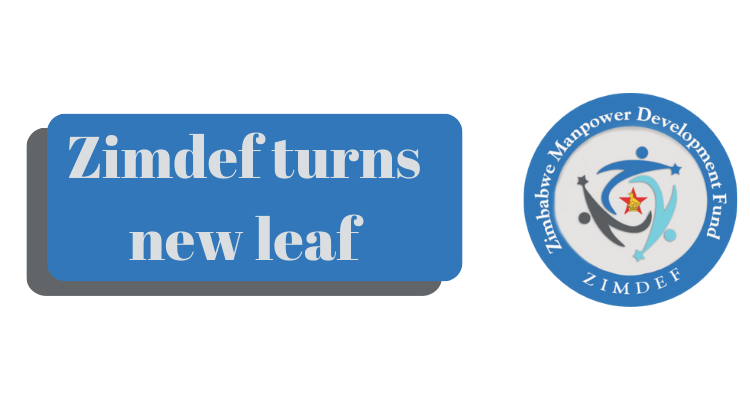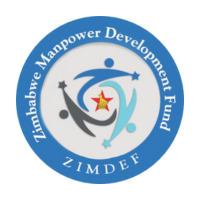
The Zimbabwe Manpower Development Fund (Zimdef) is undergoing a transformational journey to overhaul its operational model. Features Editor Emmerson Njanjamangezi (EN) recently had a chat with Zimdef chief executive Sebastian Marume (SB) to understand how the fund is being redesigned to suit its mandate of promoting skills development, innovation, and industrialisation for the modernisation of the country. Below are excerpts from the interview.
(EN) recently had a chat with Zimdef chief executive Sebastian Marume (SB) to understand how the fund is being redesigned to suit its mandate of promoting skills development, innovation, and industrialization for the modernization of the country. Below are excerpts from the interview.
EN: What is Zimdef, and what is its mandate?
SB: Zimdef stands for Zimbabwe Manpower Development Fund. This is a statutory fund established in terms of the Manpower Planning and Development Act [Chapter 28:02] and it falls under the purview of the Ministry of Higher and Tertiary Education, Innovation, Science, and Technology Development.
The mandate of Zimdef is to collect a one percent manpower training levy and disburse the same for the purposes of supporting human skills development and innovation in Zimbabwe. In terms of Section 47 (2) of the Act, the Fund was established to develop skilled manpower and professions and to support and promote the creation of new knowledge, research, innovation, science, technological and engineering solutions, and business enterprises.
EN: Zimdef embarked on a rebranding exercise recently. Is the exercise complete?
SB: Zimdef's rebranding is still ongoing as we are rebuilding our identity to perfectly align with the country's objective of realizing Vision 2030.
The rebranding was an opportunity for the Fund to reinvent and realign itself with the country's national vision of becoming an empowered upper-middle- income society by 2030 and the ministry's Heritage Based Education 5.0 mantra. Therefore, the rebranding is not just about logos and corporate colors; it is a complete overhaul of operations. Our operating systems and marketing strategy are being redesigned to suit the mandate of promoting skills development, innovation, and industrialization for the modernization of the country. We talk of brand equity, where we bring brand loyalty, awareness, and a perceived quality of service to our stakeholders.
In Notice SI 74 of 1999, every employer in Zimbabwe shall pay to the Fund a levy that is assessed at one percent of his total monthly wage bill. This refers to the gross wage bill. The levy is payable in the currency of remuneration. Therefore, an employer whose wage bill is in foreign currency must also remit their levy in foreign currency. Employers with a hybrid system of remuneration will also pay their levy in different currencies in the same ratios.
EN: What's your revenue collection target for this year?
SB: The revenue collection target for the year 2023 is $39.7 billion.
EN: As your collections are in ZWL, what's your short-term investment mix to hedge against exchange losses?
SB: True, our collections are mostly in ZWL, but the Manpower Planning and Development Act, Chapter 28:02, allows Zimdef to invest in the money market and real estate businesses. We are looking forward to participating in new instruments being issued by the government, for example, gold coins.
EN: As for revenue from real estate facilities, what's the target this year?
SB: We are looking forward to raising $463 million from rentals in 2023.
EN: What is the revenue used for? And how is it disbursed?
SB: The funds collected by Zimdef are channeled towards supporting skilled manpower development and innovation programs in Zimbabwe as directed by the Ministry of Higher and Tertiary Education, Innovation, Science, and Technology Development. Examples of such programs include, but are not limited to, supporting full apprenticeship training, industrialattachment allowances for students at polytechnic colleges, science EN: Where does Zimdef get its teacher training program funding?
SB: Zimdef receives its funding from the one percent manpower training levy, which is remitted by registered employers every month, from its real estate portfolio, and from short-term investments.
EN: Kindly elaborate on the manpower training levy and how this is applied to registered companies.
SB: In terms of the Act, read together with the Manpower Planning and Development Levy,
Industrial skills development centers, integrated skills educational outreach programs, retooling of higher and tertiary institutions, various innovation projects such as innovation hubs, industrial parks, agro-industrial parks, universities, teaching and research hospitals, and various business enterprises
EN: Regarding disbursements, how much was disbursed last year, and what's the target this year?
SB: Disbursements towardsSebastian Marume Mandates were $8.8 billion last year, and this year we expect to disburse $28.2 billion.
Zimdef has supported a slew of projects since last year. Which projects have you supported last year, and what's been the sum total of the funds expended?
SB: Last year, we supported 21 institutions by funding various projects. I will just mention a few. At the University of Zimbabwe (UZ), we constructed an innovation hub, an industrial park, and an agro-industrial park. We also funded research on chemical and biological agents and a survey on tick-borne diseases. We also funded the construction of the Quinary Hospital, which is still underway.
At Midlands State University (MSU), we funded the construction of the Innovation Hub and Industrial Park, the Pathology Center, and the National Language Institute. At Gwanda State University (GSU), we funded the construction of the Agro-Industrial Park, Engineering, and Innovation Lab, as well as the purchase of computer laboratory equipment. A total of ZWL 4,164,995,172 was expended on all the projects.
EN: For this year, how many projects are you supporting?
SB: For this year, we have pledged to support projects at at least 18 institutions.
EN: Which other notableWhat projects have been funded by Zimdef?
SB: There are quite a number; we have the construction of innovation hubs at various institutions of higher learning, namely the UZ, the National University of Science and Technology (NUST), Great Zimbabwe University (GZU), Midlands State University (MSU), Harare Institute of Technology (HIT), Chinhoyi University of Technology (CUT), etc.
There is also the construction of
the MSU National Pathology Research and Diagnostic Centre; the establishment of Agro-Industrial Parks at Marondera University of Agricultural Sciences and Technology (MUAST), Lupane State University (LSU), and Gwanda State University (GSU); and the establishment of an applied genetic testing center at NUST, among many other projects.
EN: Of the businesses you have incubated, how many have grown to be successful ventures?
SB: Zimdef financially supports business enterprise programs, not incubation. Some of the businesses that have been supported and that have gone on to be successful ventures and standalone entities include: Verify Engineering (the Medical Oxygen and Acetylene Plant); MSU (the National Pathology and Diagnostic Centre); NBA (the Marula Factory); ZING-SA (Zimsat 1; Mazoe Ground Station); and NUST (the Applied Genetic Testing Centre).
EN: How does Zimdef ensure that funds are effectively utilized for the intended purpose?
SB: Zimdef carries out routine internal audits of all institutions that receive funding. In addition, institutions are required to acquit the funds received in each budget year. The Fund is also audited externally by the Auditor General's office, which also checks the utilization of Zimdef funds at the receiving institutions. The Fund's audited accounts are published each year in the Auditor General's report in terms of the Public Finance Management Act (Chapter 22:19) and the Audit Office Act (Chapter 22:18).
EN: From your perspective, what role does Zimdef occupy towards the attainment of Vision 2030?
SB: Zimdef, through its man-
date of revenue collection and disbursement towards supporting skilled human capital development and innovation at institutions of higher and tertiary learning, has created an enabling environment for skilled human capital to innovate and industrialize for the heritage-based production of goods and services. Skilled human capital development and innovation have been identified as one of the fundamental pillars of achieving the country's Vision 2030. The government, through the Ministry of Higher and Tertiary Education, Innovation Science, and Technological Development, seeks to encourage young minds to innovate and come up with business solutions for the betterment of our nation. The Fund is indeed well placed to provide much-needed funding for such projects and enterprise development.
EN: As Zimdef and in a personal capacity, you have received a lot of accolades for your 2022 exploits. From the Presidential Performance Awards to private sector awards, you have been a prominent feature. What are your impressions of these awards?
SB: Behind the drive for recognition is the desire to create an impact, remain relevant, fulfill a mandate, surpass targets, and align with the country's Vision 2030. This recognition has come with a lot of hard work, team spirit, and working together to achieve our set goals. It is quite humbling to realize that all our efforts in championing our vision of being a resource mobilization hub for human capital development and innovation for an industrialized and modernized economy by 2030 have earned us such remarkable recognition.
EN: A few years ago, Zimdef hogged the limelight for buying bicycles for chiefs in Tsholot-sho, but now it appears to have turned a new leaf. What is it that you have done right?
SB: We have simply restored the Fund in line with the overall development goals that have been adopted by the government of Zimbabwe. In all our endeavors, we remain mindful of the overall national vision of becoming an empowered upper-middle-income society by 2030, and this informs our day-to-day operations.
I would like to thank and commend all the employers who are remitting their one percent training levy on time, as this enables us to execute our mandate. Lastly, I would like to encourage all employers to remit their one percent manpower training levy on time. This will contribute to human skills development and innovation for an industrialized and modernized economy by 2030.



.png)
.png)
What do you think? Leave a comment
0 Comment(s)